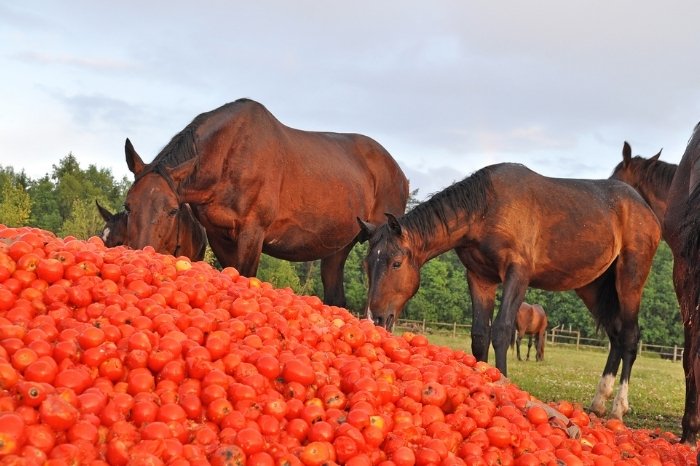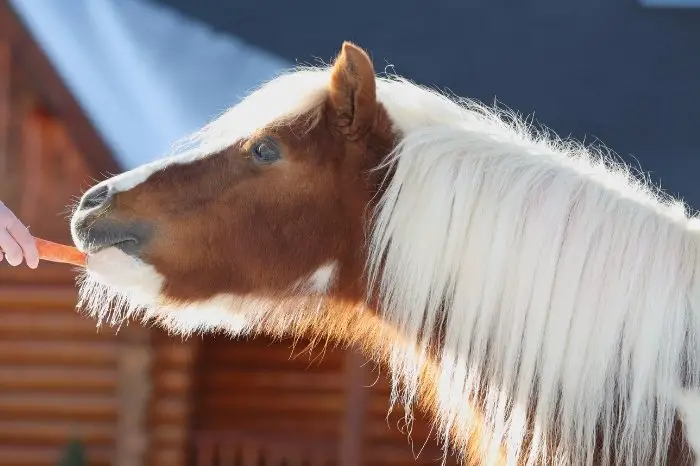Last Updated on January 12, 2023
We all know that eating salads is good for us! But does the same apply to horses – can they eat tomatoes and other salad fruits?
Horses enjoy eating many different fruits and vegetables, but we need to be careful not to let them eat anything poisonous.
Let’s take a look at tomatoes and other fruits and vegetables, and find out which ones are safest for horses to eat.
Can Horses Eat Tomatoes?
We can see why horses might be tempted to eat tomatoes – after all, they normally enjoy eating anything sweet and juicy! But can horses eat tomatoes, and are they good for them?
Unfortunately, it is not safe for horses to eat tomatoes. The reason for this is that tomatoes are a plant that is part of the nightshade family. The nightshade family of plants contains toxic alkaloids that slow down intestinal function.

Why Are Tomatoes Toxic To Horses?
Humans have evolved over the centuries to be able to digest these toxins without any problems. However, tomatoes have never been part of the natural diet for horses and they are very sensitive to the alkaloids in tomato plants.
These alkaloids are mostly concentrated in the green parts of tomato plants, such as the stem and the leaves. They are also present in smaller quantities in the fruits of the tomato plant, even when they are ripe and ready to eat.
Signs of tomato toxicity include colic and diarrhea. So, if you suspect your horse may have eaten tomato fruits or plants, contact your veterinary clinic for advice right away.
Do Horses Like Eating Tomatoes?
Luckily, horses do not enjoy the taste of tomato plants and are unlikely to eat them. However, it is still advisable to ensure that your horse cannot access your tomato plants, just in case he decides to try a nibble.
The fruits of the tomato are sweeter and more appetizing than the plant, and your horse may be tempted to give them a try. Make sure that your tomatoes are always kept out of reach of your horse, and do not encourage him to eat them.
So, although your horse might enjoy snacking on sweet little tomatoes, it is not a good idea to allow him to eat them! The good thing is that there are many other tasty and healthy treats that your horse will appreciate.
Top 5 Fruits And Vegetables For Horses
Ask any child what horses like to eat and they will most likely say apples and carrots! However, horses have adventurous tastes and will enjoy many other healthy snacks.
Why not combine some of these into a fruit salad to share with your horse? It would make the ideal treat on a long picnic ride!
Here are our top five suggestions for snacks your horse might like to try:
-
Bananas
Many horses really enjoy eating these high-energy fruits. In fact, they can eat the whole banana, even the peel!
Bananas are a good source of potassium and are a healthy and nutritious horse snack. Start by feeding small chunks by hand, and you’ll soon find that your horse chomps into a whole banana with glee!
-
Oranges
Oranges are another healthy and refreshing treat for horses. They will not enjoy eating the skin, so peel this off first. Any small pips should not be a problem, as your horse can swallow these whole.
Oranges are packed full of vitamin C, and make a great treat for you and your horse to share on a hot summer’s day.
Nutrigood Fruit Snax Horse Treats Tasty Packed with Superfoods and Real Fruit Pieces
-
Strawberries
Strawberries are so packed full of nutritional benefits we don’t know where to start! They contain high levels of potassium, phosphorous, calcium, and magnesium. Strawberries are also a good source of vitamins C, E, and K.
Another great summer snack, strawberries are a good energy boost and great for rehydrating your horse.
-
Pineapple Pieces
You will need to prepare pineapple pieces carefully before feeding them to your horse, but he will really appreciate it! The skin and core of the pineapple must be removed to prevent your horse from choking. The remaining flesh should be cut into bitesize chunks.
-
Watermelon
Horses love eating watermelon, and it is great fun watching them enjoy this juicy fruit! They can eat the fleshy part of the watermelon whole, including the pips. However, the rind is quite chewy and should be cut into smaller pieces.
How Should You Feed Vegetables To Horses?
So, now we know what fruits and vegetables are safe for horses to eat, let’s look at the best way to feed them. Most fruits and vegetables need some kind of preparation to make them safe for horses to eat. How much preparation is required depends on the type of fruit or vegetable. Horses can chew through most things, but we need to be aware of the risk of choking.
Choke occurs when pieces of food become lodged in the esophagus, the tube leading from the mouth to the stomach. This is normally a result of the horse eating his food too quickly, or not chewing it thoroughly enough. Choke is an uncomfortable condition for the horse and can be difficult to resolve.

To avoid your horse choking on fruit and vegetables, make sure that any tough parts are cut into smaller chunks. This is particularly important if you are feeding vegetables that are hard to chew, such as large carrots or melon rind. If your horse is older or has bad teeth it is a good idea to chop up all treats into bitesize pieces.
Fruits with stones inside, such as plums or apricots, must always be cut in half and have the stones removed. All fruits and vegetables should be either washed or peeled to remove any chemical residues.
Summary
So, as we have learned, it is not safe to feed tomatoes to your horse. These little fruits contain toxic alkaloids, which can cause colic and diarrhea in horses. Luckily, there are many other healthy fruits and vegetables that your horse can enjoy eating.
Do you have any questions about horses eating tomatoes? Add a comment below this post and we’ll get back to you! We’d also love to hear your suggestions on other great treat ideas for your horse!

Kate Chalmers is a qualified veterinary nurse who has specialized in horse care for the vast majority of her career. She has been around horses since she was a child, starting out riding ponies and helping out at the local stables before going on to college to study Horse Care & Management. She has backed and trained many horses during her lifetime and competed in various equestrian sports at different levels.
After Kate qualified as a veterinary nurse, she provided nursing care to the patients of a large equine veterinary hospital for many years. She then went on to teach horse care and veterinary nursing at one of the top colleges in the country. This has led to an in-depth knowledge of the care needs of horses and their various medical ailments, as well as a life-long passion for educating horse owners on how to provide the best possible care for their four-legged friends.
Kate Chalmers BSc (Hons) CVN, Dip AVN (Equine) Dip HE CVN EVN VN A1 PGCE

